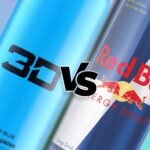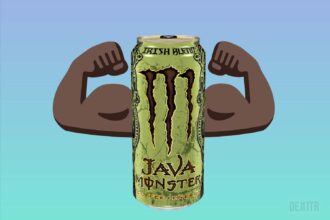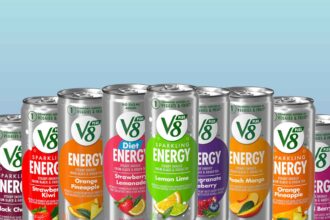Energy drinks: they promise to elevate your performance, but could they also be lifting your waistline in an uncomfortable puff? Bloating is a silent saboteur, often overlooked but deeply felt. This isn’t just about gulping down a can; it’s about understanding the ripple effects that each sip could have on your body’s internal ecosystem.
If you’ve ever felt like a balloon after downing your go-to energy booster, you’re in the right place. We’re about to dissect the science and sift through the ingredients to uncover the truth behind this bloated mystery.
Key Takeaway:
Excessive and prolonged consumption of energy drinks can cause potentially serious adverse effects on your health. As for gastrointestinal effects, symptoms such as bloating or abdominal distention may occur, causing pain or discomfort. Although the exact reason for this is not known, it is known that most of the health problems related to energy drinks are centered on their caffeine and sugar content.
The Truth About Energy Drinks and Belly Bloat
Energy drinks can have various adverse effects on different organs and systems, but their effects on the gastrointestinal tract are among the least researched conditions.
Although the FDA limits the caffeine content in soft drinks, which are classified as foods, this regulation does not involve energy drinks, which are classified as dietary supplements. However, research on their use and effects is unclear.
In addition, many energy drinks have ingredients in varying amounts that have not been sufficiently tested, such as guarana, ginseng, and taurine, which may generate uncertain interactions and accelerate risks.
How Energy Drinks Can Cause Bloating
Bloating occurs when organs, skin or other parts of the body become enlarged, and is usually the result of inflammation or fluid accumulation.
When the stomach is bloated, and there is a visible increase in this area, there is abdominal distention, however, bloating is more subjective in terms of feeling swollen, heavy, or full, and may or may not present abdominal distention.
With respect to energy drinks, these contain a variety of substances, mainly caffeine and sugar, which, when ingested in excess can irritate the stomach causing bloating, because they can increase gastric acid production.
Just one can of an energy drink can contain between 100 to 400mg, while a cup of coffee usually contains between 75 to 100mg of caffeine.
Regarding the amount of sugar in energy drinks, a 250ml can of Red Bull contains 27g of sugar, and a 473ml can of Monster contains around 56g of sugar.
The daily limitation for caffeine consumption of 400mg per day, which is equivalent to 4 cups of coffee, and as for the recommendations, sugar intake cannot exceed 25g per day.
Abdominal bloating may be due to a variety of conditions ranging from digestive conditions, hormonal or some medications.
Table of typical ingredients found in energy drinks:
| Ingredient | Function in Beverage | Effects on Body | Known to Cause Bloat |
|---|---|---|---|
| Caffeine | Stimulant | Increased alertness, heart rate | No |
| Sugar (Sucrose, Glucose) | Sweetener | Quick energy, but can lead to crash | Yes |
| Taurine | Amino Acid | May improve athletic performance | No |
| Ginseng | Herbal Extract | Possible stress relief | No |
| Guarana | Plant Extract | Similar to caffeine | No |
| B-Vitamins | Vitamin Supplement | Energy metabolism | No |
| Sodium | Electrolyte | Electrolyte balance | Yes |
| Potassium | Electrolyte | Electrolyte balance | No |
| Carbonated Water | Base Liquid | Hydration | Yes |
| Artificial Sweeteners (e.g., Aspartame) | Sweetener | No calories, but some controversy | Yes |
| Citric Acid | Preservative/Flavor | No significant effect | No |
The most common cause occurs when you eat too much or eat foods with high fiber content that can cause gas production, causing the stomach to swell.
There are usually no symptoms, but gas, stomach pain, and discomfort are typical signs of bloating.
When bloating is mild, it may go unnoticed.
Although it is unlikely to be due to a serious disease, if this symptom persists or is accompanied by other symptoms such as vomiting, diarrhea, blood in the stool, nausea, among others, you may need to see a doctor to determine the cause and rule out that its origin is something serious.
Understanding the Link: Energy Drinks and Bloating
The popularity of energy drinks has grown exponentially over time and although their excessive consumption has been associated with serious adverse effects, research on their use and potential health consequences has been low.
According to the known effects of caffeine, excessive and prolonged consumption of energy drinks can result in caffeine intoxication, the gastrointestinal symptoms of which range from stomach upset to bloating and abdominal pain.
However, very little has also been reported regarding its gastrointestinal effects.
In a report published by Garg et al. (2020), they showed a clinical case where a 34-year-old woman was diagnosed with abdominal pain for more than a year, whose diagnosis was indigestion and colic caused by atrophic gastritis and intestinal metaplasia. It was concluded that the cause could be due to regular ingestion of Red Bull and Monster Energy 1 to 2 times daily for the last 15 years.
Therefore, in addition to being treated pharmacologically, she was instructed to suspend the intake of energy drinks, obtaining a favorable reversal of her diagnosis in a period of 2 years of medical surveillance.
Another study conducted on children aged 10-12 years found that the prevalence of physical symptoms, including stomach pain, generally increased with higher consumption of these drinks (Kristjansson et al. 2014).
Seifert et al. (2011), found a report from the New Zealand poison center where 20 adverse events related to energy drinks were reported between 2005 and 2009, of which 12 cases were referred for treatment of vomiting, nausea, abdominal pain, among other symptoms in children aged 13 to 14 years.
This shows that it is necessary to have more data on the effects that can be caused by energy drinks, and for this it is necessary to conduct more research.
Chart of Food Their Bloating Potential
| Food | Info | Bloating Potential |
| Beans and legumes | Lentils, chickpeas, kidney beans, black beans, and others can be difficult to digest and cause gas and bloating. | Moderate |
| Cruciferous vegetables: | Broccoli, cauliflower, cabbage, and Brussels sprouts contain a type of carbohydrate that can cause gas and bloating. | Moderate |
| Dairy products | Some people are lactose intolerant and cannot digest the sugar in milk, which can cause bloating and discomfort. | Mild |
| Carbonated drinks | Carbonated beverages like soda and beer can release gas in your digestive system, leading to bloating. Artificial sweeteners: Sugar substitutes like sorbitol, xylitol, and mannitol are not well absorbed by the body and can cause gas and bloating. | Moderate |
| Fried and fatty foods: | High-fat foods like fried chicken and French fries can take longer to digest and cause bloating. | Severe |
| Wheat and gluten | Some people have gluten intolerance or celiac disease and cannot digest the gluten found in wheat, barley, and rye, which can cause bloating. | Severe |
| Onions and garlic | These vegetables contain fructans, a type of carbohydrate that can cause gas and bloating in some people. | Moderate |
| Apples and pears | These fruits are high in fiber, which can cause bloating and gas if consumed in large amounts. | Severe |
| Chewing gum | Chewing gum can cause you to swallow air, which can lead to bloating and discomfort. | Severe |
It’s important to note that everyone’s body is different, and some people may experience more or less bloating from these foods, depending on their individual digestive system. If you are experiencing chronic or severe bloating, it’s always a good idea to consult with a healthcare provider to rule out any underlying medical conditions.
Combatting Bloating from Energy Drinks
Energy drinks have become a big problem because there is little control by the U.S. Food and Drug Administration (FDA), resulting in many of the ingredients not being fully tested and no product labeling laws.
As a result, these beverages may not include the correct amount of caffeine.
Until the necessary regulations are in place, precautions should be taken such as promoting a healthy lifestyle that allows you to get enough sleep, a healthy diet, and exercise to obtain energy naturally, without having to choose to consume these drinks.
Energy drinks should not be part of your daily diet or consumed in excess, but if you decide to consume them occasionally, prefer to opt for options whose ingredients are natural, contain less than 200 mg of caffeine, without added sugar or sweetener or artificial coloring.
In addition, it is necessary not to ingest caffeine from other food sources when also consuming these beverages because it will increase your daily intake of this stimulant.
Drinking an energy drink once in a while will not affect you, but when consumed on a regular and prolonged basis they cause damage to your overall health, making you feel uncomfortable symptoms such as abdominal bloating, among other conditions.
Avoiding Bloating: Energy Drink Alternatives
Although energy drinks are designed to temporarily decrease feelings of fatigue and exhaustion, improve alertness and increase physical endurance, they can have adverse short- and long-term effects, because just one energy drink can contain more caffeine and sugar than you should consume in a day.
There are many alternatives that can help you obtain energy in a healthy way and avoid bloating, such as:
- Coffee: contains a moderate amount of caffeine of maximum 100mg per cup, so it allows an intake of 2 cups during the day without triggering secondary symptoms such as bloating.
- Tea (green, black or white): these also contain a reasonable amount of caffeine, so it is possible to include this beverage in your diet, such as yerba mate and matcha tea.
- Water: staying well hydrated helps you not to feel fatigued.
Energy Drinks and Digestion: A Delicate Balance
Digestion is the process by which the gastrointestinal tract breaks down food into substances or nutrients that the body can use as a source of energy for the correct functioning of the organism.
When caffeine is ingested, it is rapidly and completely absorbed from the gastrointestinal tract into the bloodstream, being easily distributed throughout the body (Nadeem et al., 2020), this takes place about 30 to 60 minutes after caffeine ingestion in the absence of food.
High amounts of caffeine in energy drinks cause an increase in the production of gastric acids and increase the reflux of these acids into the esophagus, and may induce or increase symptoms of pain, discomfort or bloating related to poor digestion.
At the same time, the large amounts of sugar in the intestinal cavity slow down the rate at which the carbohydrate is absorbed by the intestinal villi and may cause a laxative effect (Menéndez et al., 2011). In addition, caffeine also increases intestinal motility.
On the other hand, the high concentrations of sugar in these beverages can alter the intestinal microbiota (intestinal bacteria) increasing the risk of obesity and metabolic syndrome (Alsunni, 2015). This can also lead to altered immune function.
Finally, once they reach the bloodstream caffeine increases blood pressure and heart rate, while sugar creates a spike in blood glucose levels, known as a “sugar rush”, but once that initial energy is burned off, an imbalance in hormone release occurs, because caffeine can also cause decreased insulin sensitivity causing blood glucose levels to remain elevated.
Given this, when the high wears off, the body responds like it’s under stress.
However, after 6 hours of caffeine ingestion, half of it is still in the body, so its total elimination can take between 12 to 24 hours to leave the bloodstream.
Before You Leave: A Parting Gift of Wisdom!
Since its inception, the popularity of energy drinks has been increasing.
More than 50 energy drink brands are present in more than 140 countries, and they are available in supermarkets, beverage stores, and online.
They are the fastest-growing U.S. beverage market, with half of the market made up of children, teenagers, and young adults.
As such, their regulation has been a challenge given that their marketing is primarily aimed at this population.
In addition, manufacturers claim that energy drinks are completely nutritional, protecting themselves from the caffeine limits imposed on soft drinks and from the safety testing and labeling required for pharmaceutical products.
This risk can result in serious adverse health effects, especially for children.
Therefore, further experimental research should be conducted to establish the relationship between the reported effects of energy drinks consumption and adverse reactions in order to strengthen the existing poor regulation for the marketing of these drinks, based on scientific, objective, and quality information necessary for a proper discussion on the subject.













